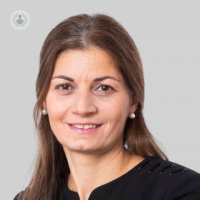What’s the best treatment for fibroids?
Written in association with:Uterine fibroids, or non-cancerous growths in the uterus, can cause a range of symptoms including heavy menstrual bleeding, pelvic pain and pressure on surrounding organs. In this article, leading consultant obstetrician and gynaecologist Ms Eleni Mavrides answers the question: “What’s the best treatment for fibroids?”.

The best treatment for fibroids depends on factors such as their size and location, the severity of symptoms, and the patient's desire to maintain fertility. Here are some of the most common and effective treatments available:
Medications
Medications are often the first line of treatment for fibroids, particularly in women with mild symptoms. These include:
- Hormonal therapy: Medications like birth control pills, patches, or intrauterine devices (IUDs) that release progestin can help regulate menstrual cycles and reduce heavy bleeding associated with fibroids.
- GnRH agonists: These medications reduce oestrogen and progesterone levels, shrinking fibroids and reducing bleeding. They are typically used for short-term relief or to shrink fibroids before surgery.
- Non-hormonal medications: Anti-inflammatory drugs like ibuprofen or tranexamic acid may be used to reduce heavy bleeding.
Minimally invasive procedures
For women seeking effective relief without the need for major surgery, minimally invasive options are available:
- Uterine fibroid embolisation (UFE): In this procedure, small particles are injected into the blood vessels that supply the fibroid, cutting off its blood supply. The fibroid then shrinks over time, alleviating symptoms.
- Endometrial ablation: This treatment destroys the lining of the uterus, which helps reduce or stop heavy menstrual bleeding caused by fibroids. However, it is not suitable for women who wish to preserve fertility.
- MRI-guided focused ultrasound surgery (FUS): This is a non-invasive procedure that uses high-intensity ultrasound waves to destroy fibroids. It offers a quicker recovery time than traditional surgery.
Surgical options
In more severe cases, surgery may be required to remove fibroids. Some of the most common surgical options include:
- Myomectomy: This procedure involves the removal of fibroids while preserving the uterus, making it a good option for women who want to maintain fertility. Myomectomy can be performed through open surgery, laparoscopy, or hysteroscopy, depending on the size and location of the fibroids.
- Hysterectomy: For women who no longer wish to have children, a hysterectomy (removal of the uterus) is the most definitive treatment for fibroids. This procedure completely eliminates the chance of fibroids recurring and can be done through various approaches, including minimally invasive techniques.
Each treatment option comes with its benefits and risks, and the best choice will depend on individual circumstances, including whether the patient wants to retain the ability to have children.
Do you require expert treatment for fibroids? Arrange a consultation with Ms Mavrides via her Top Doctors profile.


